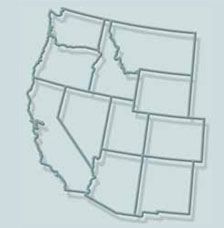
Water law battles loom as changing snowmelt patterns strain decades-old "gentlemen’s agreements"
“These [water] agreements were negotiated, literally, in a different climate, well before global warming was a concern in the water management community, ”Kenney et al. wrote. Overall, the research team found:
- Earlier spring melt has increased the length of the irrigation season in many areas, with water users exercising rights earlier and longer. In states with calendar dates written into law, there is little enforcement of those dates.
- Administrative flexibility is being exhausted. Some water administrators reported the erosion of water users’ “gentlemen’s agreements” on diversion schedules.
- Legal disputes are not yet occurring, but appear likely in the future, as winners and losers become more apparent. In general, junior water holders are vulnerable, but enforcement of calendar dates in water rights could protect juniors from expanding senior rights.
The authors also called for better training of water managers, and for improvements in the design and operation of water models.![]()
defining storage and irrigation seasons by date, for example, there is a growing mismatch between those dates and actual water-flow patterns, the new study found.
For their “reconnaissance-level” review of water law and lawsuits in 11 Western states, Doug Kenney, a Senior Research Associate at the University of Colorado’s Natural Resources Law Center, CIRES’ Roberta Klein (Center for Science and Technology Policy Research), and Christopher Goemans from Colorado State University pored through statutes and administrative rules governing water, court cases involving water rights, and journal articles. They also interviewed water users, lawyers, and administrators.
While climate change has significantly altered the timing of water flow in the West, it has not triggered on-the-ground water disputes. But according to a new Western Water Assessment study, “this period of calm may not last much longer.”
In many areas of the U.S. West, mountain snow is melting earlier, shifting peak spring streamflows forward by as many as two weeks in the last 50 years. Global climate models predict the earlier flows are a consequence of climate change.
Yet many Western water laws—which designate who can use water and when—do not deal explicitly with calendar dates. When laws do consider timing,


